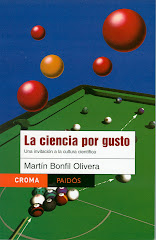By Martín Bonfil Olivera
Published in Milenio Diario, August 26, 2009
 In 1957, Hugh Everett III, a United States physicist with a prince's name (not Rupert Everett, a British actor as, I mistakenly stated in the printed version of this column on Milenio Diario), proposed one of the most intellectually stimulating ideas in modern physics: the many-worlds interpretation of quantum mechanics.
In 1957, Hugh Everett III, a United States physicist with a prince's name (not Rupert Everett, a British actor as, I mistakenly stated in the printed version of this column on Milenio Diario), proposed one of the most intellectually stimulating ideas in modern physics: the many-worlds interpretation of quantum mechanics.
It is not clear whether this theory can be really called "scientific" because, like a lot of cosmology, it does not have direct evidence, although it does have a coherent physical and mathematical background. It tried to solve a big problem of the most popular version of quantum mechanics (the Copenhagen interpretation): that the equations predict that particles can exist in "superposed states", unless these are observed.
To ridicule this idea, Erwin Schrödinger, one of the fathers of quantum mechanics, postulated the mental experiment of the cat that shares his last name, which would be simulotaneously "dead and alive" as long as it is not observed. Something contrary to common sense.
Everett's version proposed an astonishing solution: the moment the particle -or the cat- is observed, instead of randomly choosing one of the two possibilities, the universe bifurcates, giving birth to two parallel universes: in one universe, the cat lives; in the other one, it dies.
Although in a recent interview in Discover magazine mathematical physicist Roger Penrose, one of today's most brilliant minds, labeled it as "insanity", the fact is that Everett's odd -but not absurd- theory still is of interest to a lot of physicists.
But in 1941 Jorge Luis Borges, one of the glories of Hispano-American literature, had published his extraordinary short story The Garden of Forking Paths, where he prefigured the many-worlds theory. Sometimes the connections between science and literature are as amazing as the most audacious scientific theories.
Last August 24, Borges would have turned 110 years old. Maybe in another possible reality, where he is more long-lived, he does. In another one, it is normal to be that old.
Maybe there are alternate realities where the Mexican educational system is not in wrecks, where future teachers don't massively flunk the test to select them. Where their union leader is not elected for life, and can pronounce words with more than two syllables such as "epidemiologic", or initials such as "H1N1" without confusing numbers "1" with letters "l".
Where vital parts of Mexican history are not omitted from school textbooks, such as the Spanish conquest or the three centuries of colonial domination.
Maybe.
(translated by Adrián Robles Benavides) To receive Science for pleasure weekly
in your email, subscribe here!





No comments:
Post a Comment